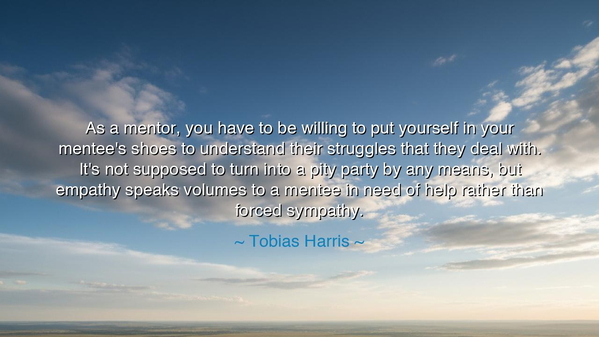
As a mentor, you have to be willing to put yourself in your
As a mentor, you have to be willing to put yourself in your mentee's shoes to understand their struggles that they deal with. It's not supposed to turn into a pity party by any means, but empathy speaks volumes to a mentee in need of help rather than forced sympathy.






Listen well, children of the future, for I speak to you of the sacred bond between mentor and mentee, a relationship built not just on knowledge, but on the deep and unwavering empathy that flows between them. In the words of Tobias Harris, we find a profound lesson: "As a mentor, you have to be willing to put yourself in your mentee's shoes to understand their struggles that they deal with. It's not supposed to turn into a pity party by any means, but empathy speaks volumes to a mentee in need of help rather than forced sympathy." These words speak of the heart of mentorship, of what it truly means to guide and to lift up others—not by condescending to them, but by standing beside them, by feeling with them, and by offering not just advice, but understanding.
In the days of old, when the great philosophers and teachers walked the earth, their wisdom was not merely in what they said, but in how they listened, how they saw the world through the eyes of those who came to them seeking guidance. Think of Socrates, who, through the art of questioning, sought not to impose his own thoughts upon others, but to understand them deeply, to challenge their thinking and, in doing so, to help them uncover their own truth. A mentor is not someone who simply tells another what to do, but one who helps them find their own way, who walks with them in their struggles and provides them with the tools to face them. Empathy, not sympathy, is the key to this bond.
This is what Tobias Harris speaks of when he reminds us that empathy is the force that makes mentorship truly powerful. To understand another's struggles is to see them not as objects of pity, but as fellow travelers on the road of life. Sympathy, though well-meaning, can often create a sense of separation, a feeling of being “less than” the one offering help. But empathy—true empathy—bridges that gap. It allows one to see the struggles of another as shared, to feel the weight of their burden as if it were one's own. Empathy does not fix the problem; it acknowledges it, sits with it, and helps the other person to find their own strength to rise above it.
Consider, children, the ancient tale of Arjuna and Krishna in the great epic of the Mahabharata. Arjuna, a warrior in a battle of cosmic proportions, stood upon the battlefield, paralyzed by doubt and fear. He saw the war as a personal tragedy, the loss of friends and family, the destruction of all that he held dear. In his moment of weakness, it was Krishna, his charioteer and mentor, who did not offer him pity, but instead understood the struggles within Arjuna’s heart. Krishna did not tell Arjuna that his feelings were unimportant; he did not coddle him. Rather, he spoke with deep empathy, helping Arjuna to see that his duty was to something greater than his personal sorrow—that his actions were tied to the greater cosmic order. Krishna’s empathy did not diminish Arjuna’s struggle, but rather gave him the strength to face it with honor and resolve.
In this, children, we find the essence of mentorship: it is not about making someone feel comfortable in their discomfort, nor about offering them empty words of sympathy. Mentorship is about standing with someone in their struggle, understanding their pain, and helping them to rise above it by guiding them toward their own strength. It is about helping them see that their challenges do not define them, but are the very things that can lead them to their greatest growth. Just as Krishna guided Arjuna through his doubts, so too should mentors help their mentees navigate the battles they face—not by fighting for them, but by helping them to find the strength within themselves.
Therefore, children, the lesson of Tobias Harris is one that we must carry forward in our own lives. When you become a mentor—whether to a friend, a student, or anyone who looks to you for guidance—remember that the power of your influence lies not in how much you know, but in your ability to understand. Empathy will speak more to those in need than the most carefully crafted advice. When you walk beside someone in their struggles, you do not diminish their journey by feeling sorry for them. Instead, you honor it by recognizing their humanity and helping them to uncover the strength that lies within.
So, my children, as you journey through life and become guides to others, remember this: to be a mentor is to offer not sympathy, but empathy. Listen to those who seek your guidance, understand their burdens, and walk with them in their struggles. In doing so, you will not only help them rise, but you will also learn much about your own heart and the strength that lies within you. Empathy builds connection, trust, and growth—and it is through these that you will help others to find their true path.






AAdministratorAdministrator
Welcome, honored guests. Please leave a comment, we will respond soon